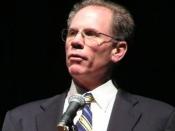As McChesney states, "Our era rests upon a massive paradox" (1). He means that although we live in the supposed "Information Era", during which large amounts of information can be transferred in matters of seconds, the people of this era are becoming increasingly ignorant about the political environment. One would think that more advanced types of communication and the development of the Internet would drastically increase the public awareness of political happenings. The fact that this is not the case creates the paradox that McChesney mentions.
He continues to express his confusion by saying "by conventional reasoning, this is nonsensical" (2). According to him, the only way a community with such advanced technology would not flourish politically and solve civil issues is if the community itself is uninterested in governmental issues or the politics of a matter. McChesney goes on not to blame the public, but clearly states that "the media system has much to answer for" (2).
He then moves on to his argument that the media actually hinders the public from becoming involved in governmental concerns, and actually calls it a "significant antidemocratic force in the United States" (2). The media has made political information almost too easy to access, which in turn made the public lazier. The media feed off this laziness like a parasite because it gives them the power to heavily influence and give the public a bias view of a governmental issue. However, he admits that he does not believe that media is the sole cause of the decline of the interest in politics, but has become a large supporter of it. He also blames the profit-driven companies, hypercommercialism, and the decline of true journalism. Therefore, all of these contributed to the decline of the interest in politics, and McChesney names...


